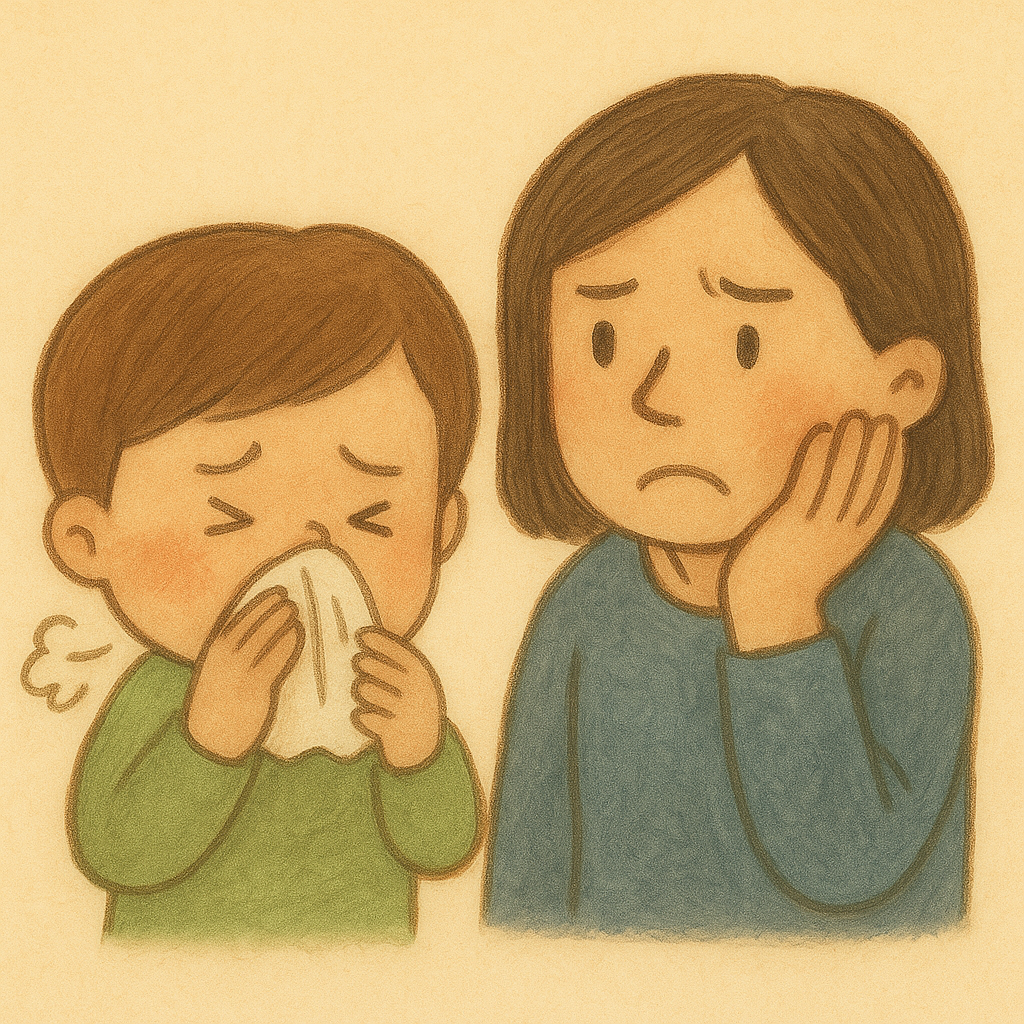
“Why don’t you understand?” “No matter how many times I say it, you do the same thing.” “You’re not a baby anymore, so enough already!”
When parenting, there are moments when anger boils over, or you just want to let out a deep sigh. You try to communicate, but it doesn’t get through. You want to be understood, but you’re not. Rather than anger, a deep sense of futility begins to spread. Perhaps you’ve experienced this yourself.
It’s not that you want to be angry. You believe they should understand if you explain it, that they should be able to do it by now—but reality doesn’t match. Facing this repeated “failure to connect” can feel like your voice isn’t being heard, and your role as a parent is being negated. It builds up a sense of loneliness and powerlessness.
The Role of “Parent” and the Struggle for Congruence
“Maybe I lack leadership.” “Am I raising them the wrong way?” “Even if I try hard, nothing gets through—maybe I have no value as a parent.”
Such self-critical thoughts often rise up. As Carl Rogers said, congruence refers to the harmony between our inner experience and outward expression. But the more we internalize the role of “how a parent should be,” the more we hide our true feelings and struggles, making congruence increasingly difficult.
This is especially true for families raising children with foreign backgrounds or supporting children attending alternative or nontraditional schools. The pressure to explain themselves to others, or the fear their parenting style won’t be accepted, creates added social strain and makes it even harder to feel congruent.
Seeing Our Own Flaws in Our Children
Sometimes, a child’s behavior reflects a part of ourselves we dislike or a weakness we struggled with in the past:
“They don’t listen—just like me.” “They miss chances from being too cautious—just like I did.” “Their tantrum face looks eerily like mine.”
This isn’t unusual. Developmental and psychoanalytic theories suggest that parents may unconsciously project unresolved emotions or issues onto their children (Bowlby, 1988).
However, such realizations do not mean you are immature as a parent. Instead, they offer a tender moment to reconnect with parts of yourself through your child’s behavior—a chance for reconnection and reflection.
Unconditional Positive Regard—Toward Yourself
Another essential Rogers concept, unconditional positive regard, is the ability to accept the other person as they are. It is not only for our children but also something we must extend toward ourselves.
“Is it my fault they turned out this way?” “Is it genetics? Environment? Maybe both are wrong.”
When such thoughts consume us, self-esteem erodes silently. Modern psychology, however, has moved beyond the nature vs. nurture dichotomy, recognizing development as an interaction of both (Bronfenbrenner, 1979).
Children growing up in multilingual or multicultural environments often experience being misunderstood at home or school. Parents observing this may also wonder: “How can I best support my child?” or “Did I do something wrong?”
Empathic Understanding Leads to Self-Acceptance
Empathic understanding is the effort to grasp another’s feelings and meanings from their perspective. It is also a vital stance to apply inwardly.
When we see our weaknesses reflected in our children, it’s natural to feel: “Why did they inherit this trait?” “I don’t want them to suffer like I did.”
But such thoughts stem from a desire to finally cherish that younger, vulnerable version of yourself.
Try saying to yourself:
- “They’re working hard on what I used to struggle with.”
- “I kept going even when I didn’t feel good enough.”
- “My child shares some traits with me but also holds new possibilities.”
Transform the gaze of self-denial into one of empathy. As you care for your child, you can also reconcile with yourself. That journey may be the true essence of parenting.
Don’t Blame Anger—Examine It
Psychology suggests anger often masks deeper feelings: the need to be understood or accepted (Bandura, 1997; Deci & Ryan, 1985). Over time, repeated unmet emotional needs can erode self-worth and lead to reactive or controlling behaviors.
Parents of children who don’t attend school often wrestle between “Why won’t they just go? I’m doing my best” and “I want to respect their feelings.” Please don’t dismiss your own emotional conflict.
Likewise, parenting in a multilingual or cross-cultural context means encountering unfamiliar situations where social norms and expectations don’t apply. It’s okay to feel frustrated, but beneath that lies the yearning to connect and be understood. Don’t lose sight of that.
Why Do Parents Always Have to Be the Ones to Endure?
“Why is it always the parent who has to tolerate everything?” This is a deep question many parents wrestle with.
If that patience becomes a one-way duty of “because I’m the parent,” it can explode into anger or self-denial. Don’t silence your inner voice that says, “I’m human too.”
Before being a parent, you are a person. It is okay to feel tired. It’s okay to need support.
Rethinking the Relationship
Children do not act according to our plans. That’s normal. It’s a vital part of their growth. That’s why we must shift from focusing on “how to say it” to “how to connect.”
Children with diverse learning paths—those needing language support, attending inclusive settings, or engaging in homeschooling—all have their reasons. And the parents walking alongside them naturally feel anxious or alone when they don’t fit the “norm.”
There are no perfect parents. When communication breaks down, it might be an opportunity to build a bridge across that gap. And perhaps the first step is this: for you to embrace the version of yourself that once longed to be understood.
「伝わらない」苦しさに寄り添う──“怒り”と“自己否定”のあいだで揺れる親のこころ
「なんでわかってくれないの?」「何度言っても同じことをする」「もう赤ちゃんじゃないんだから、いい加減にして」――。
子育てをしていると、思わず怒ってしまったり、深いため息をつきたくなる瞬間があります。
伝えているのに、伝わらない。わかってほしいのに、わかってもらえない。
その繰り返しに、怒りというより、むしろ「むなしさ」が広がっていく。
そんな経験はないでしょうか。
本当は、怒りたくて怒っているわけではありませんよね。
言えばわかるはず、何度も言っているのだからそろそろできるはず――。
けれど現実はそうならない。
そんな「伝わらなさ」に直面するたびに、自分の声が届いていないような、親としての存在が否定されていくような、寂しさや無力感が積み重なっていきます。
自己一致しづらい「親という役割」
「自分には指導力がないんじゃないか」「育て方が間違っているのではないか」「努力しても伝わらないのは、親としての自分に価値がないからかもしれない」――。
そんなふうに、自分を責める気持ちがこみ上げてくることもあるでしょう。
ロジャーズが述べたように、自己一致(congruence)とは、自分の内面と外の表現が調和している状態です。
しかし、親として「こうあるべき」という役割が強まるほど、自分の本音や苦しみを隠してしまい、自己一致が難しくなっていきます。
これはとくに、外国につながる子どもを育てている家庭や、不登校・オルタナティブスクールに通う子どもを支えている親にとって顕著かもしれません。
「周囲に説明しなければ」「わが家のやり方が受け入れられないかもしれない」――そんな社会的な視線が、親の自己一致をさらに困難にさせます。
自分のなかの「嫌な部分」が、子どもの姿に重なるとき
ときに、子どものふるまいのなかに、「自分の嫌いな部分」や「昔の自分の弱さ」を見てしまうことがあります。
「人の話を聞いていないところが、私にそっくりで嫌だ」 「慎重すぎてチャンスを逃すところ、自分と同じ」 「かんしゃくを起こすときの目つきが、なんだか私に似ていて、ゾッとする」
これは決して珍しいことではありません。
発達心理学や精神分析的視点において、親が無意識のうちに自分の未解決の感情や課題を子どもに投影することがあるとされています(Bowlby, 1988)。
しかし、こうした気づきは、決して親としての未熟さを意味するものではありません。
むしろ、子どもの姿を通して、自分自身の心にそっと立ち返ろうとする、あたたかな「再会」や「つながり直し」の機会として、大切に受けとめていきたいものです。
無条件の肯定的配慮──親が自分に向けるまなざし
ロジャーズが重視したもう一つの条件、「無条件の肯定的配慮(unconditional positive regard)」は、相手をありのままに受け入れる姿勢です。
これは、子どもに対してだけでなく、親自身にも必要なまなざしです。
「この子がこうなったのは私のせい?」「遺伝?育ち?どちらもダメなんじゃないか」
そんなふうに思い詰めてしまうとき、自己肯定感は見えないところでじわじわと削られていきます。
けれど、心理学の現代的理解では、「遺伝か環境か」という二項対立は過去のものとされ、両者が相互に作用しながら発達が進むとされています(Bronfenbrenner, 1979)。
たとえば、日本語以外の言語や文化にふれる子どもたちは、家庭でも学校でも「理解してもらえない」と感じる場面が多くあります。
それを間近で見守る親もまた、「この子をどう支えていいのかわからない」「私の育て方が悪かったのでは」と、自己責任感に苦しむことがあるのです。
共感的理解から生まれる自己受容
もう一つの中核条件、「共感的理解(empathetic understanding)」とは、相手の立場からその人の感情や意味を理解しようとする態度です。
そしてそれは、自分自身に向けても大切にしたい姿勢です。
子どものなかに自分の苦手を見つけたとき、 「なんでこんな性格、受け継いじゃったんだろう」 「私のような思いをこの子にさせたくないのに」 そう思う気持ちは、決して間違っていません。
でも、それは「あのときの自分を、もう一度大事にしたい」という願いでもあるのです。
だからこそ、こんなふうに語りかけてみてください。
- 「私が苦手だったことを、この子も今、がんばっているんだね」
- 「私も、そのままじゃダメだと思いながら、ここまでやってきたんだよね」
- 「この子には、私と同じところも、私にない可能性もあるんだ」
自己否定のまなざしを、共感のまなざしへ。
子どもと向き合いながら、自分自身とも和解していけたら、その歩みこそが「育てること」の核心なのかもしれません。
怒りを「責める」のではなく「見つめ直す」
心理学では、怒りの背景には「わかってほしかった」「受け入れてほしかった」という感情があるとされています(Bandura, 1997/Deci & Ryan, 1985)。
そして、その「わかってもらえなかった」経験が長期的に積み重なることで、自己肯定感が揺らぎ、人間関係において過剰な反応やコントロール欲求として表れることもあります。
たとえば、不登校の子どもを抱える家庭では、「なんで学校に行ってくれないの?」「自分はこんなに支えているのに」という思いと、「この子の気持ちを尊重したい」という願いのあいだで、心が揺れ動きます。
その葛藤を抱える自分を、どうか否定しないでください。
また、多言語環境や文化的背景の異なる子どもたちと関わるとき、「常識」や「当たり前」が通じない場面が多くあります。
親はついイライラしてしまうかもしれませんが、その背景にあるのは、理解されたい・通じ合いたいという願いであることを、どうか忘れずにいてください。
親ばかり我慢しなければならない?
「どうして親ばっかり我慢しないといけないの?」 それは、多くの親が抱える根源的な問いです。
けれど、その“我慢”が「親だから当然」という一方通行の義務になっているとき、それは怒りや自己否定となって噴き出します。
「私だって人間なんだ」という叫びを、自分で否定しないこと。
親であることの前に、ひとりの人間として、疲れたり、助けが必要になったりしてもいいのです。
関係性を見つめ直すということ
子どもは、大人の思い通りには動きません。それは当たり前のことであり、発達のプロセスに欠かせない部分です。
だからこそ、「伝え方」ではなく、「つながり方」に目を向けてみることが求められます。
多様な学びを選ぶ子どもたち――日本語指導が必要な子ども、インクルーシブな教育環境を選んだ子、不登校やホームスクーリングの子どもたち。
それぞれの選択や背景には、子どもなりの理由があります。
そこに寄り添う親もまた、「普通」に揃わないことへの不安や焦りを抱えるのは当然です。
完璧な親なんていません。
何度言っても伝わらないと感じるときこそ、子どもとの“ずれ”に橋をかけるチャンスなのかもしれません。
その第一歩は、「わかってもらえなかった自分自身」を、自分がまず受け止めることから始まるのです。
References:
- Bowlby, J. (1988). A Secure Base: Parent-Child Attachment and Healthy Human Development.
- Bronfenbrenner, U. (1979). The Ecology of Human Development.
- Deci, E. L., & Ryan, R. M. (1985). Intrinsic Motivation and Self-Determination in Human Behavior. Plenum.
- Bandura, A. (1997). Self-efficacy: The Exercise of Control. Freeman.
- Rogers, C. R. (1957). The Necessary and Sufficient Conditions of Therapeutic Personality Change. Journal of Consulting Psychology.

コメントを残す